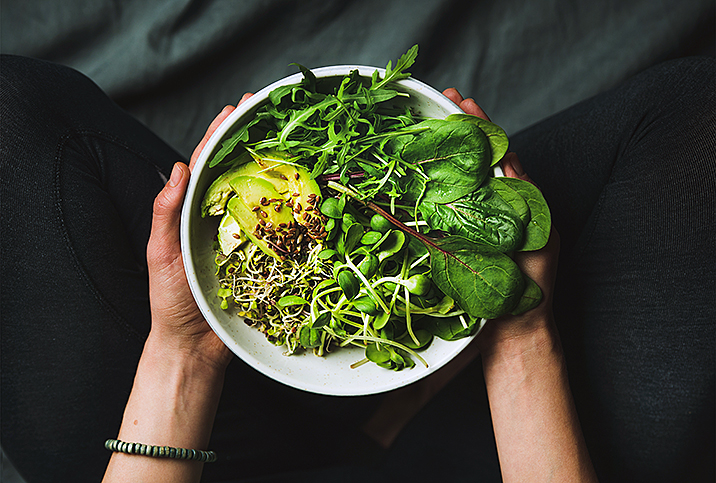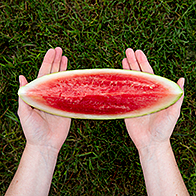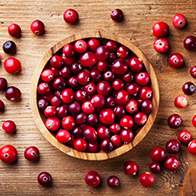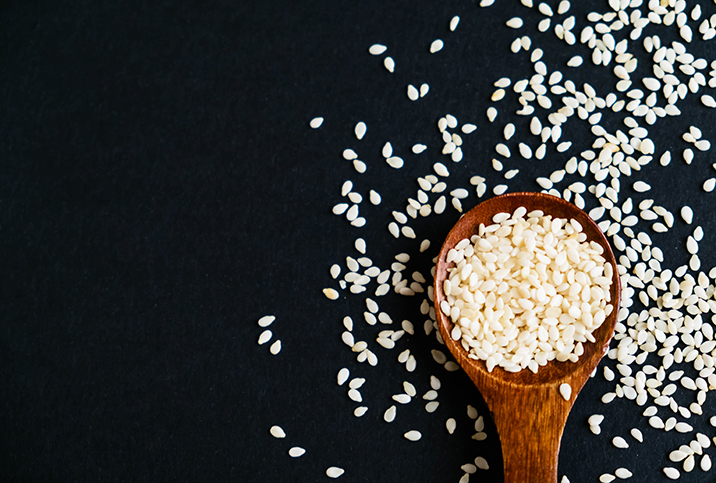Plant-Based, Soy-Rich Diets May Reduce Menopause Symptoms

At one point, all those ads about menopausal relief seemed so far off. Night sweats? Hot flashes? The flushes? C'mon...that only happens to little old ladies, right?
But now, it's not so funny. You're in your 40s or 50s (though you could be a little younger or older) and experiencing those exact symptoms—and many others in perimenopause caused by the rise and fall of estrogen levels.
Those hormonal changes are what contribute to sleep problems, vaginal dryness (and thus painful intercourse) and mood swings. Additional issues—like depression and anger—can become very serious.
For years, the main solution has been hormone replacement therapy (HRT)—that is, getting estrogen (and perhaps progesterone) through a pill, skin patch or other options.
But a new study, published in the October 2021 issue of the journal Menopause, suggests a plant-based diet might soothe your symptoms naturally. The study emphasized a key ingredient in the diet consumed by half of the participating women: soy.
"This is a game-changer for women aged 45 and over, most of whom we now know can get prompt relief from the most severe and troubling menopause symptoms without drugs," study leader Neal Barnard, M.D., recently said in an interview with News Medical.
The benefits of healthful foods
In a recent presentation about the study, Barnard noted he was inspired by Japanese dietary changes, pointing out "hot flashes were rare" in the 1980s. Most Japanese people ate rice-based diets, and only around 14 percent suffered from this issue. By the early 2000s, though, "as meat and dairy products became popular," hot flash rates soared—reaching 42 percent of Japanese women.
In this study, half of the 38 women (average age 54) followed a 12-week totally low-fat vegan diet, including a half cup of soy daily. The other half—the control group—kept to their regular diets.
While 94 percent of control participants continued to have moderate-to-severe hot flashes, the low-fat vegan participants saw a significant reduction: By week 12, only 41 percent were affected by hot flashes.
Rosanne Sheinberg, M.D., director of integrative medicine in the Department of Anesthesiology & Critical Care at Johns Hopkins Medicine in Baltimore, Maryland, collaborated with Barnard on a separate plant-based diet trial, just as COVID developed.
"We were looking at plant-based diets [possibly helping] hospital workers. We're always a busy group of people," said Sheinberg, but, of course, it was even more frantic once the pandemic erupted. Sheinberg noted the diet study found "patients lost weight, decreased fasting blood sugars, and decreased cholesterol."
Sheinberg pointed out it's harder for strict diets to enroll larger numbers because "we can't isolate people from how they eat." That's why she thinks that though small, the new research adds important insights.
She added, "We've known for some time that the isoflavones from soy foods can have some benefit. Not always miraculous, but they tend to have some improvement in the vasomotor symptoms," like those mentioned earlier. When Barnard "added a whole dietary intervention on top of that, [he] got even better results," she said.
The drawbacks of soy-based diets
California-based women's hormone specialist Maritza Worthington, FDNP, CHNC, said she wouldn't recommend this diet to her patients. "If someone's basing [their] protein [intake] on soy alone, that's problematic. Plant-based diets can be actually highly inflammatory—lectins that are in most beans, soybean included, can create digestive upset," Worthington stated.
"You want to make sure that your diet is anti-inflammatory, and that you're not completely removing a macronutrient that is going to actually help so many of those menopausal tendencies that come up, such as bone loss (osteoporosis) and cardiovascular disease," she added.
Alternatives to cutting out meat entirely
That's why instead of completely removing all meat, Worthington recommends spending a little extra on quality products. Sheinberg doesn't totally object, and said, "Meat from grass-fed cows is actually…much less inflammatory to our system."
"Many cultures embrace a vegan diet and use a variety of plant-based proteins to help meet nutritional needs. Some healthcare providers can and do encourage a plant-based lifestyle," said Nancy Farrell Allen, RDN, FAND, a dietitian based in Fredericksburg, Virginia. She also worked on a study with Barnard.
"There are so many amazing plant-based items in the market today that make this lifestyle a possibility for some individuals," Allen explained.
Worthington advised women to consider seeking a personal dietary profile. "Nutrition is like the pink elephant in the room that your primary care physician is probably not addressing," she said. "So it's one of those things where you want to go with a nutritionist who specializes in hormone health."




















